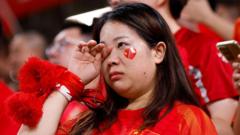On a sweltering Thursday night in Saitama, the Chinese national football team faced a dismal reality, suffering a staggering 7-0 defeat to Japan. As the final whistle blew, it marked the lowest point for the team, trailing behind in the FIFA world rankings at a woeful 90th place, just ahead of countries like Curaçao and Luxembourg.
Described as "rock-bottom" by local media, the loss followed a year of disheartening performances, including defeats against Oman, Uzbekistan, and Hong Kong. Just a week later, the situation worsened when dozens of players and officials were arrested in a massive corruption scandal encompassing gambling and match-fixing—part of a two-year investigation into the country's football governance.
China once envisioned itself as a future football superpower, driven by the ambitions of the Communist Party under President Xi Jinping, who is an avid fan of the sport. Xi had outlined three dream goals for Chinese football: to qualify for the World Cup, host it, and ultimately win it. Yet, ten years into his leadership, the dream has begun to fade, with even Xi acknowledging an element of luck in recent, slim victories.
Experts argue that China's systematic issues within football stem from the overarching control of the Communist Party, which has stifled the growth of the sport. Mark Dreyer, a sports writer based in Beijing, emphasizes that the rigidity of this regime leads to poor results in competitive sports. Unlike successful footballing nations, which boast structured leagues fostering grassroots talent, China's approach has been top-heavy and politically driven.
Investments and government influence in football have led to numerous political appointments, with sports decisions being made by officials who lack football expertise. This has hampered the organic growth of the game, meaning that fewer children are playing football and there is a lack of talent at the elite level. For comparison, England has over 1.3 million registered players, while China struggles with fewer than 100,000 despite its vast population.
Interest in football remains strong in China, with the women's national team ranked 17th globally, drawing significant viewership during tournaments. However, the men’s team faces criticism and disappointment, highlighted by dwindling attendance as over 40 professional clubs have shut down following the economic impact of the pandemic and corruption.
The turmoil does not end there. The downfall of club giants, like Guangzhou Evergrande, showcases the financial instability within Chinese football, further exacerbated by a culture of corruption that has come to light recently. The shocking confessions from former players and officials reveal how entrenched these practices have become, with instances of fixed matches and bribery.
As the nation grapples with the realities of its footballing crisis, the resilience of fans shines through. Yet, amid their disappointment, humor has surfaced online, where supporters quip about the consistency of the men’s team’s lackluster performances. The echoes of a popular journalist's sentiment resonate widely: "Football needs skill, and physical and tactical training, not just political rhetoric.” Only time will tell if these ambitions for revival can transform amidst troubling realities.





















